Interview with Steven Sapp
Erin Washington: Where does an idea for a new project come from within your group?
Steven Sapp: Everything has to be in consensus and that is hard. Slanguage, which was our first major produced show, developed organically. Jo Bonney, who was our director at the time, didn’t really know us. We were already performing in New York in the poetry scene and when we got with her she didn’t really know what to do with us. She was like I don’t even know what this is. We would go to her office and just bring writing everyday and sit there for two to three hours and just read the stuff. We’d start to put some pieces together and she was trying to find a through-line. And to her, the fascination was how we flipped language. It was like Wow! The way you guys can take a nursery rhyme and then do this with it, or take this and make a song out of it, or take this and make a poem out of it. And then, inside of that, there’re all these different styles of poetry we knew and ways that we approached it. She was like I just think this show’s about language. And we were like Yeah! And so, we really started to zoom in on that and that became the first show. We toured Slanguage for about eight years. That was a long time.
The second major show was Ameriville. We were sitting around and we were like Alright, what are we going to write about? We saw a pattern how fear was being used to move the American public around. We were studying the Salem witch trials. We went to Salem, Massachusetts, and they have a big museum out there. There’s a timeline showing all these major historical events that people got really freaked out about—like Communism in the ’50s and the AIDS epidemic—all these major moments, along with the Salem witch trials.
We were going to write about the history of fear in America and then Katrina happened. So, we responded to it as artists do—we wrote a piece connected to New Orleans. As we were putting the pieces together—actually, the opening ten minutes of Slanguage is this piece New Orleans that we created. We performed it for our director at the time, and he sat there and was like You just summed up the whole piece in ten minutes. This is what this piece should be about. It should be looking at this country through the lens of Hurricane Katrina. And we were like Oh. I mean, we didn’t know if we wanted to write a show about New Orleans. And when we allowed ourselves the freedom to say Yeah, we can write this. We don’t have to be from New Orleans to have a commentary on this, it opened up our creative juices and we plowed through.
Erin: Why the hesitancy to create?
Steven: It was real touchy. There was a lot of grumbling behind the scenes. And some people didn’t know us and they were like Well, who are they? Who did they talk to? and They don’t really know. But we knew our own hearts and we did the research that we needed to do. We had talked to the “mayors” of the city—the certain people in the community that you need to talk to. So, we just kind of moved on and finished the piece.
Erin: With each piece, is the community aspect important to Universes?
Steven: Yeah. You need to know what you’re writing about. I think you need to connect with the community on a personal level. If it ends up in the show, cool. But do it for yourself. I think there’s a certain amount of blessing you need to receive. You’ve got to get the elders’ blessings.
Erin: How does the community and the traditional theatre audience connect?
Steven: I want to see the traditional theatre audience sitting with the communities that the pieces invoke. What one person might get, the other person doesn’t get, and what the other person doesn’t get, that person gets. So, you can see some theatre people and they’re watching us and…this is something new to them and they’re maybe very fascinated or whatever is going through their minds. And then you get the other half who is like Oh, I totally get what they’re doing. And it’s kind of like shorthand and they get all the references and they are maybe angry that we are saying things they don’t want to hear said, so it’s an interesting balance. But, I think our rooms—if the marketing has been done right—is a wide range of ages and experiences all sitting in a room watching a piece of art and having some commentary on it.
If you’ve ever seen us perform anywhere—if you’ve followed us—you will see the same energy and passion. If we were in a community center, if we were in a jazz club, if we were on the street corner—which we’ve done—if we’re in a major regional theatre, you’re going to see the same type of energy.
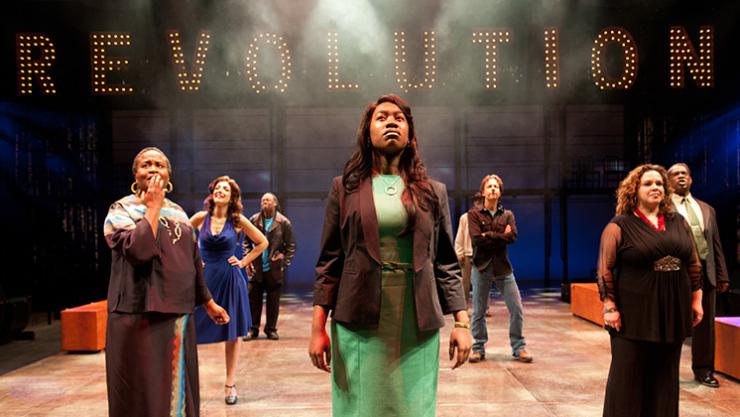
Erin: So, do you feel that your commission by Oregon Shakespeare Festival for Party People will continue to break down those walls?
Steven: Yeah. Because one: it’s at a major regional theatre, so it already has a built-in traditional theater audience that goes to see work. But then with this show, we’re talking about the Black Panthers and the Young Lords and, for our people, those are major players in the game in terms of our history. So, folks who don’t go to the theatre at all might be sitting there going Oh…the Black Panthers? Up in here? I got to go see this. So you’re going to have the average theatregoer: sixty-five, white, who goes to see Shakespeare, who goes to see Neil Simon, who goes to see Tony Kushner who is going to be sitting in a room watching a story about the Black Panthers and the Young Lords—and it’s a nontraditional play. They’re singing and now they’re doing poetry and they’re dancing—it’s all this stuff. On the other hand, folk that we know are going to come through just out of sheer curiosity. It’s going to be an interesting visual to see people from all backgrounds coming in the room together.
Erin: Do you consider yourself a hip-hop group devised ensemble?
Steven: Well, I’ll tell you this: when we started, we didn’t classify what we were doing. We got labeled all these different things. So for us, we were a poetry group. We were in the poetry scene for a long time and then the downtown performance scene found us and we became a downtown poetry ensemble. Then the New York Times reviewed us and all of a sudden we were a theater company. This is everyone else giving us names. We were friends with Danny Hoch so when the Hip-Hop Theater Festival started and everyone was like Yeah this is the hip-hop theatre movement and we’re all hip-hop theatre artists. I remember sitting on a panel and I was like That’s not what we do. And the room got quiet. When we sit in a room, that word never comes up. None of that stuff comes up. We just work. Now, because of where we come from, because of what our influences have been growing up, you’re going to get a strong dose of hip-hop in it. But, you’re also going to get some Latin Bolero, Jazz—a little bit of everything. We don’t sit in a room and say Let’s create some hip-hop today. We don’t do that.
Erin: So more like a devised poetry group?
Steven: So, now we have “devised”—which is the hot topic word that’s been floating around for the last two years. It’s another label to put on what people are doing. I’ve never said that Universes does devised work and for the last year and a half that’s all I’ve heard. Well, you know, you guys do devised work. And we jokily said in the room Oh, are we devising? Are we devising? What we are doing is theatre. Period. Now, there’s more than one person in the room so it’s ensemble theater. We thought once it got labeled “ensemble theatre” we were like Okay that is what we’re doing. We are an ensemble of people and we collaborate together, so that’s what we’re doing, so yeah. I understand the tradition. A playwright writes a play, hands the play in, then people read it, and then they hire people and they get in a room, start the rehearsal process and put the piece together. And I’m like Well, yeah. We do that. We write the work, we get with a director, we collaborate with the director, and a dramaturg, then the piece gets put together. So, I get confused. Is that devised? Is it devised because there’s more than one of us in a room? So, I think it’s a marketing thing. It’s a funding thing. But for us when it comes to the work, I don’t have any time for that stuff. I really don’t care. Let the marketing people do it.
Erin: How do you collaborate with each other in the room? What role does the director play?
Steven: Since we come from the poetry scene we would just create these five- and ten-minute pieces and then we take them to the open mic and do them. We still kind of create work like that. It can start with a song, it can start with a poem, a joke—there are no set rules. One of our biggest pieces started out as a joke. Everyone was laughing and joking about how different people walk in the neighborhood. And Jo Bonney was sitting there and was like You guys need to write that down. That’s a piece. And we thought No, that’s us being stupid, laughing and joking in the room. But to her, it was something she’d never heard of before. This is theatrical. You guys need to write that down. And so, we wrote it down.
How we create pieces is still very organic. If we’re working on something specific like a show or a topic we know where to go: Okay, it’s the Black Panthers and the Young Lords. I’m going to do some research. I’m going to write a piece about police brutality. I’m going to write a piece about shotguns. I’m going to write a piece about being misunderstood. I’m going to write a piece about being arrested. I’m going to write a piece about J. Edgar Hoover. A director for us is someone who takes all that stuff that comes out of us: songs, music, poetry, monologues, scenes, and makes a sense of order out of it. A director really helps to keep it on track, keep it focused, and can be objective and not care that so-and-so only spoke twice, so now I need to speak, or I wrote this and I really like it and I want it to be in the piece. In one sense, he has to leave us alone and let us create in the way we need to create.
Erin: Do you feel differently from when you guys were just doing your shows in the poetry clubs? Do you feel a huge pressure when you do go into the theater with these four-week rehearsal processes?
Steven: If you’ve ever seen us perform anywhere—if you’ve followed us—you will see the same energy and passion. If we were in a community center, if we were in a jazz club, if we were on the street corner—which we’ve done—if we’re in a major regional theatre, you’re going to see the same type of energy. It’s the same thing.
Erin: So Universes is sixteen years old! That’s amazing. Did you ever think when you all first started that you would get to this point?
Steven: No. To be honest with you, the thing I really love about this is that it was just five friends hanging out doing poetry on a stage. We had a piece that we used to do—We didn’t come here to be your friend/We came here to kick your ass. We were in the poetry scene and people didn’t know what the hell we were, so we really had to take space and we would come out rough, rugged, and raw. We would have three or four performances in a night. The stakes just kept getting raised and we just kept going with the stakes. And now, there’s a responsibility. Once we saw what we represented in American theater, [we realized] there’s a responsibility to be here.
Erin: Do you feel like you want to pass that responsibility down to younger groups and how are you doing that?
Steven: We are mentoring a young theatre company in Harlem, The Movement Theatre Company. I was on a panel for the future of Black Theatre and Jonathon [McCrory] stood up and was like Where are my mentors? Mildred [Ruiz-Sapp] and I saw the intensity in his face and I was like, I have to make sure we connect with that brother and stay connected to him and his company. And we have.
Erin: Now, do you guys have a producer or do you produce on your own?
Steven: We produce on our own. I really feel that’s been our bread and butter. We’ve learned on the job. When you’re learning it’s like Whoops, that’s wrong. But we handle our own business. So, I feel like when we go into a room, even with OSF, or with Arena Stage, or even with the Goodman, or the Public, when they start talking about budgets and all that type of stuff, we can totally sit right there in that room
Erin: Do you feel like there’s a time limit for you and some of the founding members? Or will Universes continue to go on long after you?
Steven: We’ve had other members of the company who moved on and we’ve had other people come into the company. It grows and changes and that is cool. So, I sit and I think about why I’m doing what I’m doing and do I still enjoy going out on the road and performing on stage, and we do really, really enjoy it. It’s really great to be in a profession where you can’t get aged out.
Erin: Who are some theatre artists, or any artists, who inspire Universes?
Steven: Nina Simone, Tom Waits, Prince, Wu-Tang, Eric Bogosian, Danny Hoch, Dael Olandersmith, Amiri Baraka, Sonia Sanchez, Reggie Gaines—these are the people who do it for us. They really come correct. From poetry, hip-hop, all that stuff, they really bring it with their art. So, yeah.

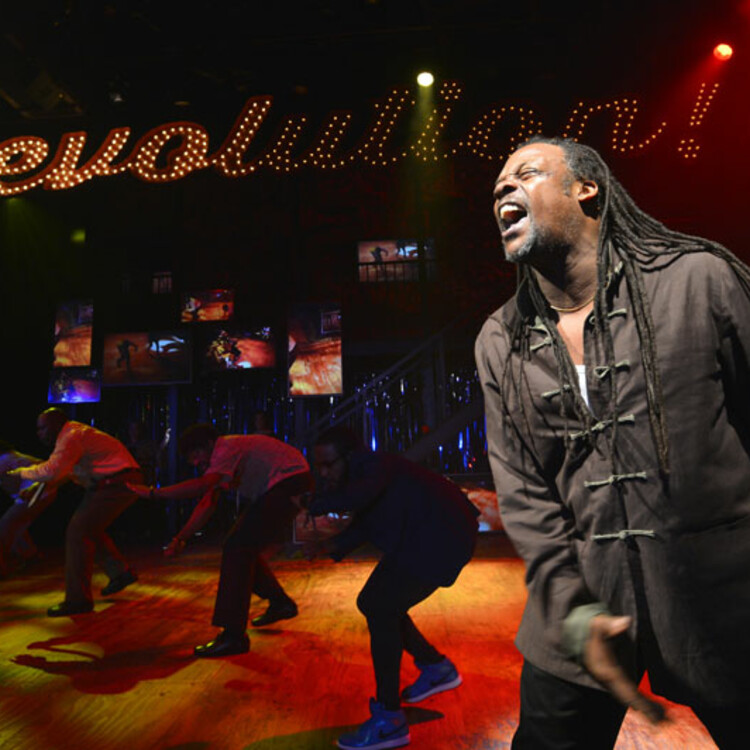
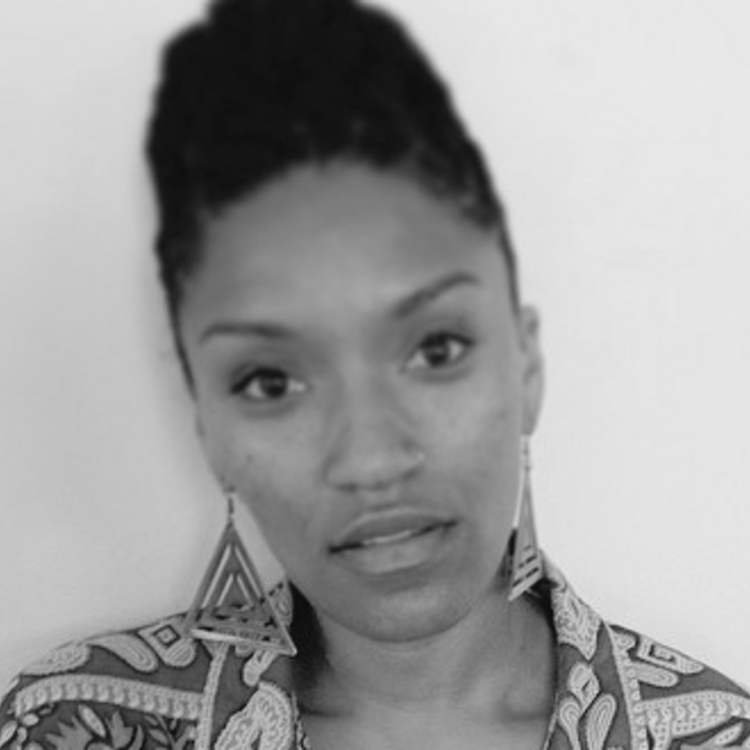
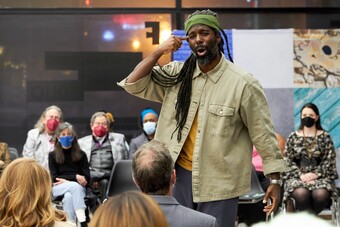




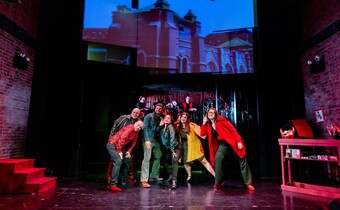


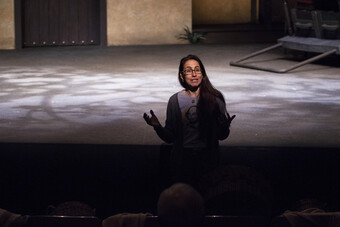


Comments
The article is just the start of the conversation—we want to know what you think about this subject, too! HowlRound is a space for knowledge-sharing, and we welcome spirited, thoughtful, and on-topic dialogue. Find our full comments policy here